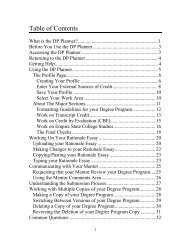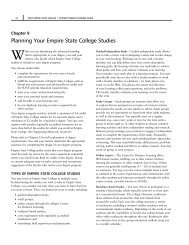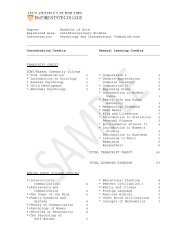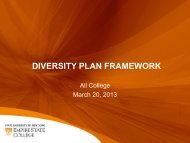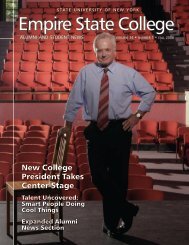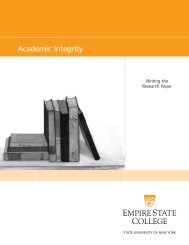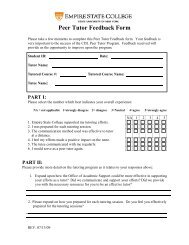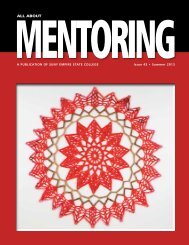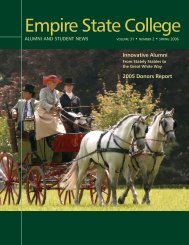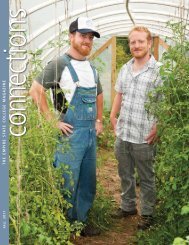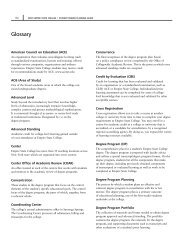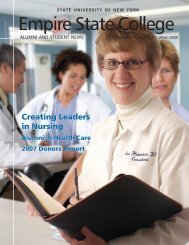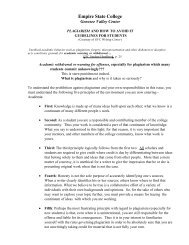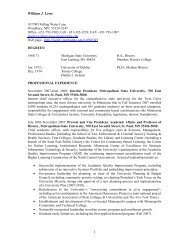Academic Plan 2011-2015 (PDF 524kB) - SUNY Empire State College
Academic Plan 2011-2015 (PDF 524kB) - SUNY Empire State College
Academic Plan 2011-2015 (PDF 524kB) - SUNY Empire State College
You also want an ePaper? Increase the reach of your titles
YUMPU automatically turns print PDFs into web optimized ePapers that Google loves.
<strong>SUNY</strong> <strong>Empire</strong> <strong>State</strong> <strong>College</strong>: <strong>Academic</strong> <strong>Plan</strong> <strong>2011</strong> - <strong>2015</strong> 9<strong>Academic</strong> programs are the registered offerings of the college and include undergraduate areas ofstudy, structured undergraduate programs (i.e., nursing), graduate programs and certificates. Theterm “academic program” does not refer to the degree programs that our students develop, but ratheraddresses academic programs at an institutional level.Themes are meant to represent broad interdisciplinary academic areas of student interest and,therefore, areas in which we need to ensure our ability to offer learning opportunities. This may meannew program development – a new AOS, a new graduate program, new certificates (both graduateand undergraduate) – or learning opportunities offered, for example, through independent study,study groups, classes or online courses, or residencies. In some cases, they represent areas in whichstudents increasingly seek to do concentrations or earn advanced degrees. In other cases, they primarilyrepresent a need to be able to provide study offerings. Themes are employed to guide new programdevelopment, as well as to complement our existing programmatic offerings, not to replace them.Theme B: Environments for Mentoring, Teaching and Learning seeks to capture theinterrelationships among the three areas under its purview while remaining sensitive to themultidimensional nature of the environment in which our students learn. This section includesfour goals: (1) create effective, rich, and flexible learning environments, addressing the range ofissues identified across all areas of infrastructure – academic, technological, physical and social –that comprise and support what we have termed “learning environments;” (2) enhance academicassessment, preparation, and support for all students through the early identification of appropriatelevels of academic readiness, as well as by providing the appropriate support for those studentsthroughout their educational careers at the college; (3) enhance educational planning for studentsin relevant programs, focusing on a core value and practice of the college; and (4) improve the priorlearning assessment and academic review process.Theme C: Faculty <strong>Plan</strong>ning, Scholarship and Development seeks to identify goals which will supportand strengthen our faculty community as a whole. Two goals were constructed: (1) ensure that ourfaculty have the content and practice expertise necessary to serve the current and future needs ofstudents, and (2) support faculty development in terms of scholarship and practice. The goals andobjectives outlined in this section focus on the faculty as a collective and at the institutional level, noton the professional development, career planning or particular work-life balance needs of individualfaculty members that are better addressed on an individualized basis.Theme A: <strong>Academic</strong> ProgramsIntroductionThe <strong>Academic</strong> <strong>Plan</strong> represents an opportunity to reaffirm the college’s relationship with, andobligations to students by defining how our strengths, values and aspirations may serve their needs.Therefore, the overarching purpose of ensuring that the academic plan reflects and is grounded ina commitment to student success will be served by honoring and fortifying foundational elementsof the college, including our focus on the adult learner and the tradition of liberal arts education,and adapting these to opportunities which emerge from the evolving needs of learners and society.Additionally, in order to sharpen our appreciation for the college’s historical commitment to studentcenteredvalues and how these help to inform our judgment about the academic direction of thecollege, the <strong>Academic</strong> <strong>Plan</strong> is based on a careful review of several resources and documents.



